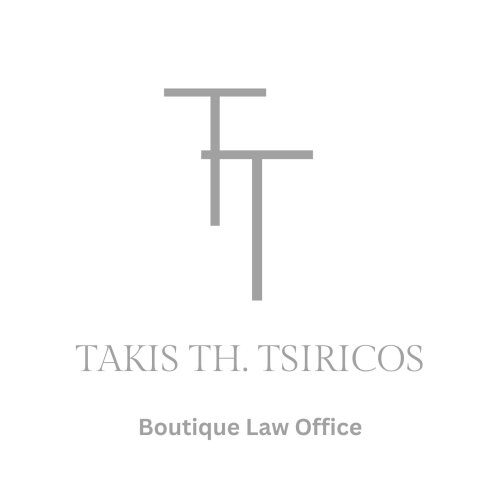Best Telecommunications and Broadcast Lawyers in Greece
Share your needs with us, get contacted by law firms.
Free. Takes 2 min.
Or refine your search by selecting a city:
List of the best lawyers in Greece
About Telecommunications and Broadcast Law in Greece
The telecommunications and broadcast sectors in Greece are essential components of the country's infrastructure, underpinning both economic activity and social interactions. Governed by a combination of national law and EU directives, these sectors are subject to regulations concerning the provision of services, allocation of frequencies, media pluralism, consumer protection, and competition. Not only do they facilitate communication across Greece, but they also play a crucial role in shaping public opinion and culture through diverse digital media offerings.
Why You May Need a Lawyer
There are several situations where individuals or businesses may require legal assistance in the telecommunications and broadcast fields in Greece:
- Starting a new telecommunications business or broadcasting entity.
- License application and compliance with regulatory requirements.
- Disputes over network access or service delivery with providers.
- Issues related to consumer rights and data protection.
- Intellectual property concerns, such as content creation and ownership.
- Mergers and acquisitions in the telecom or media sectors.
- Ensuring compliance with EU regulations affecting telecommunications in Greece.
Local Laws Overview
Greek telecommunications and broadcast laws focus on safeguarding both economic interests and consumer rights. Some key aspects include:
- The Hellenic Telecommunications and Post Commission (EETT) is the primary regulatory body overseeing these sectors, ensuring fair competition and efficient service provision.
- Licensing: All telecom operators must secure appropriate licenses from EETT, which also oversees frequency allocation.
- Consumer Protection: Laws are in place to protect consumer rights, including transparency in billing and service options.
- Data Privacy: Compliance with the General Data Protection Regulation (GDPR) is mandatory, safeguarding personal data security and privacy.
- Broadcasting: Television and radio broadcasters must adhere to rules pertaining to content, advertising, and media ownership to ensure diversity and prevent media monopolies.
Frequently Asked Questions
What is the primary regulatory authority for telecommunications in Greece?
The Hellenic Telecommunications and Post Commission (EETT) is the main regulatory authority responsible for overseeing telecommunications and postal services in Greece.
Do I need a license to start a telecommunications company in Greece?
Yes, operating a telecommunications service requires obtaining a license from EETT, which involves meeting specific criteria and regulatory requirements.
How are consumer rights protected in Greece's telecom sector?
Consumer rights are protected under various national laws and EU directives, which cover aspects like contract transparency, data privacy, and fair billing practices.
What are Greece's privacy laws related to telecommunications?
Telecommunications in Greece must comply with the GDPR, ensuring robust data protection mechanisms for safeguarding personal information.
How can I resolve a dispute with a telecom provider in Greece?
Initial steps involve contacting the provider's customer service. If unresolved, you may file a complaint with EETT or seek guidance from legal professionals specializing in telecommunications law.
Are there media ownership restrictions in Greece?
Yes, to maintain media pluralism and prevent monopolistic practices, Greece has laws restricting media ownership concentration.
What are the implications of EU telecommunications regulations on Greek companies?
Greek companies must adhere to EU regulations affecting market competition, cross-border services, and technological harmonization within the EU.
How can I ensure compliance with broadcasting content regulations in Greece?
Broadcasters must follow National Council for Radio and Television (NCRTV) guidelines, which cover content, advertising, and ethical standards.
What legal issues might arise when acquiring a telecom company?
Legal matters can include due diligence, compliance with competition laws, transfer of licenses, and potential liabilities of the acquired company.
How does Greece regulate online streaming services?
Online streaming services are subject to national and EU regulations concerning content licensing, advertising, data protection, and consumer rights.
Additional Resources
Several resources can assist those seeking guidance in this field:
- Hellenic Telecommunications and Post Commission (EETT) provides regulatory information and consumer guidance.
- Ministry of Digital Governance plays a role in policy development and digital transformation.
- National Council for Radio and Television (NCRTV) oversees content regulation and compliance.
- Industry bodies, such as the Hellenic Association of Mobile Application Companies, offer networking and advocacy opportunities.
Next Steps
If you need legal assistance in telecommunications and broadcasting, consider the following steps:
- Identify your specific legal needs, whether they pertain to regulatory compliance, licensing, or dispute resolution.
- Consult with a lawyer specializing in telecommunications and broadcast law who has experience navigating Greek and EU regulations.
- Ensure that any legal professional you work with is familiar with both local rules and broader European directives that affect this sector.
- Prepare relevant documentation, agreements, and a clear outline of your legal concerns to facilitate effective consultations.
Lawzana helps you find the best lawyers and law firms in Greece through a curated and pre-screened list of qualified legal professionals. Our platform offers rankings and detailed profiles of attorneys and law firms, allowing you to compare based on practice areas, including Telecommunications and Broadcast, experience, and client feedback.
Each profile includes a description of the firm's areas of practice, client reviews, team members and partners, year of establishment, spoken languages, office locations, contact information, social media presence, and any published articles or resources. Most firms on our platform speak English and are experienced in both local and international legal matters.
Get a quote from top-rated law firms in Greece — quickly, securely, and without unnecessary hassle.
Disclaimer:
The information provided on this page is for general informational purposes only and does not constitute legal advice. While we strive to ensure the accuracy and relevance of the content, legal information may change over time, and interpretations of the law can vary. You should always consult with a qualified legal professional for advice specific to your situation.
We disclaim all liability for actions taken or not taken based on the content of this page. If you believe any information is incorrect or outdated, please contact us, and we will review and update it where appropriate.
Browse telecommunications and broadcast law firms by city in Greece
Refine your search by selecting a city.












